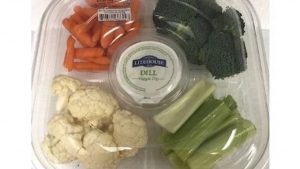Continuing with all things melon, did Del Monte cantaloupes, imported from a farm in Guatemala, sicken at least 20 people in 10 states with Salmonella Panama beginning in Feb. 2011?
Or was the link a result of zealous health types in Oregon and at the U.S. Food and Drug Administration?
William Neuman of the N.Y. Times writes a lawsuit filed by Del Monte Fresh Produce against FDA is being cheered by many in the produce industry, who often complain about what they call overreaching by regulators and welcome a company with resources pushing back.
Aside from suing the F.D.A., the company has threatened legal action against a leading state food-borne disease investigator in Oregon, where the Del Monte cantaloupes were identified as the .jpg) cause of the salmonella outbreak. And it has challenged some of the basic techniques of food safety investigations, like relying on ill people’s memories of what they ate when microbiological testing does not find pathogens on food.
cause of the salmonella outbreak. And it has challenged some of the basic techniques of food safety investigations, like relying on ill people’s memories of what they ate when microbiological testing does not find pathogens on food.
Dennis Christou, vice president of marketing for Del Monte Fresh Produce, which is based in Coral Gables, Fla., said, “It’s got to be a comprehensive and reliable investigation, and in our opinion this was neither. There’s absolutely no basis in the claim that this was done intentionally to intimidate or bully anyone.”
The company said Wednesday that it was in talks with the F.D.A. to resolve the dispute and expected an agreement soon.
When the outbreak was emerging, epidemiologists used data from Costco membership cards and found that the melons came from one farm in Guatemala, called Asunción Mita, owned by Del Monte Fresh Produce.
The investigators, working with the federal Centers for Disease Control and Prevention and the FDA asked Del Monte Fresh Produce for a recall, following the usual procedure. The company at first resisted but, according to its lawsuit, eventually agreed to a limited recall to prevent the FDA from issuing a broad warning about contaminated melons that could have affected the entire cantaloupe market. The recall was announced on March 22.
But in mid-July the FDA issued an import alert, saying that the conditions that caused the contamination might still exist on the Asunción Mita farm. The alert allowed inspectors to stop cantaloupes grown on the farm from entering this country.
Del Monte Fresh Produce fired back, filing its lawsuit and accusing federal and state inspectors of conducting a slipshod investigation. And it questioned the validity of the results because .jpg) investigators had not found a cantaloupe contaminated with the bacteria that had made people sick.
investigators had not found a cantaloupe contaminated with the bacteria that had made people sick.
The company’s filings include an audit report of the Guatemala farm, submitted to the FDA last month, which raises questions about the company’s practices.
The audit, done by a company hired by Del Monte Fresh Produce, found that a pipe containing raw sewage and wastewater emptied into an open ditch about 110 yards from the farm’s packing house. The ditch led into a lagoon containing additional sewage, more than 220 yards from the packing house. The audit recommended that the ditch be eliminated.
Mr. Christou said the ditch was protected by barbed wire to keep large animals from tracking the waste into fields. He said the lagoon contained chemicals to speed decomposition of the waste and was away from fields and wells. After the audit, he said, the company extended the pipe all the way to the lagoon and discontinued use of the open ditch.
Asked if having raw sewage in an open ditch near its packing house was consistent with high food safety standards, Mr. Christou said that tests on melons had found no pathogens.
Dr. Michael T. Osterholm, director of the Center for Infectious Disease Research and Policy at the University of Minnesota, said, “There’s no doubt the data are very tight. Del Monte caused that outbreak.”
And he said that many investigations involving sickness from produce did not find contaminated food because by the time officials became aware of the outbreak, the tainted produce had been eaten or discarded.
A table of cantaloupe- (or rock melon) related outbreaks is available at http://bites.ksu.edu/cantaloupe-related-outbreaks.
 On May 21, 2019, the Wisconsin Department of Health Services announced that vegetable trays produced by Del Monte Fresh Produce Inc. and sold at Kwik Trip convenience stores in Wisconsin and Minnesota are linked to three illnesses in Wisconsin and one illness in Minnesota.
On May 21, 2019, the Wisconsin Department of Health Services announced that vegetable trays produced by Del Monte Fresh Produce Inc. and sold at Kwik Trip convenience stores in Wisconsin and Minnesota are linked to three illnesses in Wisconsin and one illness in Minnesota.




.jpg) time the source has been identified, the product has already been consumed or taken off the shelves.”
time the source has been identified, the product has already been consumed or taken off the shelves.”
 Epidemiology is actually a much faster and more powerful tool than is laboratory confirmation.”
Epidemiology is actually a much faster and more powerful tool than is laboratory confirmation.”.jpg) cause of the salmonella outbreak. And it has challenged some of the basic techniques of food safety investigations, like relying on ill people’s memories of what they ate when microbiological testing does not find pathogens on food.
cause of the salmonella outbreak. And it has challenged some of the basic techniques of food safety investigations, like relying on ill people’s memories of what they ate when microbiological testing does not find pathogens on food..jpg) investigators had not found a cantaloupe contaminated with the bacteria that had made people sick.
investigators had not found a cantaloupe contaminated with the bacteria that had made people sick. exposed to the implicated food and made ill. There needs to be a balance because some epidemiologists may be overly aggressive with insufficient information or pulling the trigger too fast. This lawsuit could do more harm than good but it might make epidemiologists more cognizant of the fact that they’re responsible for not only public health, but economic consequences.”
exposed to the implicated food and made ill. There needs to be a balance because some epidemiologists may be overly aggressive with insufficient information or pulling the trigger too fast. This lawsuit could do more harm than good but it might make epidemiologists more cognizant of the fact that they’re responsible for not only public health, but economic consequences.”.jpg) have some worries of legal threats, that does not drive our investigation, but causes us to do a better job," he said.
have some worries of legal threats, that does not drive our investigation, but causes us to do a better job," he said. .jpg) and food service operators should not serve them. The cantaloupes, grown in and shipped from Del Monte Fresh’s farm Asuncion Mita in Guatemala, have a light brown color skin on the exterior with orange flesh. The recalled cartons of cantaloupes are dark brown cardboard with the “Del Monte” logo in red lettering and “cantaloupes” in yellow lettering on a green background. The cantaloupes have the lot codes: 02-15-24-10, 02-15-25-10, 02-15-26-10 and 02-15-28-10. No illness has been linked to cantaloupes from other sources.
and food service operators should not serve them. The cantaloupes, grown in and shipped from Del Monte Fresh’s farm Asuncion Mita in Guatemala, have a light brown color skin on the exterior with orange flesh. The recalled cartons of cantaloupes are dark brown cardboard with the “Del Monte” logo in red lettering and “cantaloupes” in yellow lettering on a green background. The cantaloupes have the lot codes: 02-15-24-10, 02-15-25-10, 02-15-26-10 and 02-15-28-10. No illness has been linked to cantaloupes from other sources.